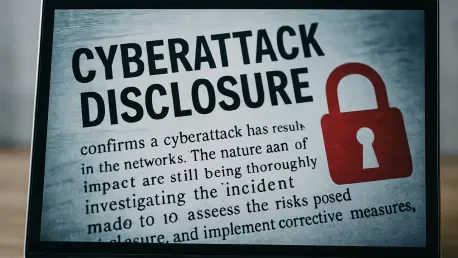In today’s digital era, cyberattacks have become alarmingly frequent, striking businesses with a precision and tenacity that is both unsettling and relentless. Reports suggest that a staggering number of companies face cyber threats daily. But beyond the numbers lies a critical question: Are businesses doing enough, or indeed required, to disclose these occurrences to the public?
The Digital Threat Landscape
Businesses around the globe grapple with mounting cybersecurity challenges. The sophistication of cyberattacks has soared, with malicious actors employing advanced techniques that often outpace current defenses. This escalation not only imperils sensitive data but also poses a significant financial burden. Companies are witnessing substantial losses, both in revenue and customer trust, adding urgency to the discourse on disclosure transparency.
Navigating the Current Legislation
The varying landscape of cyberattack disclosure laws in the U.S. and the U.K. presents a complex ecosystem for businesses to navigate. Following a notable social engineering attack on Marks & Spencer (M&S), the call for mandatory reporting has gained traction. The incident highlighted the industry’s vulnerability and the detrimental ripple effects caused by opaque communications. Despite existing regulations in the U.S. requiring public companies to disclose material breaches, gaps in transparency suggest more needs to be done to enhance collective intelligence and preparedness against future threats.
Voices from the Frontline
M&S chairman, Archie Norman, has been vocal about the imperative for mandatory disclosure. After the company’s significant financial hit—over $400 million in the wake of a cyberattack—a broader conversation has emerged. Cybersecurity experts and real-world examples illustrate the downside of non-disclosure, where companies opt for silence due to reputational fears, inadvertently leaving others vulnerable. However, research indicates that mandatory reporting can bolster cybersecurity efforts, offering a compelling case for legislative reform.
Practical Guidance for Businesses
For companies facing cyber threats, establishing a robust disclosure policy is paramount. Implementing a mandatory reporting system can aid in closing intelligence gaps, allowing for enhanced defense mechanisms through shared insights. Businesses are encouraged to collaborate with government bodies, fostering a culture of transparency that underpins stronger collective cybersecurity resilience.
In conclusion, the dialogue surrounding mandatory cyberattack disclosure has evolved into a critical component of modern cybersecurity strategy. As businesses and regulators ponder next steps, the focus should be on developing comprehensive reporting standards that not only protect stakeholders but also fortify the digital infrastructure against ever-growing cyber threats.









